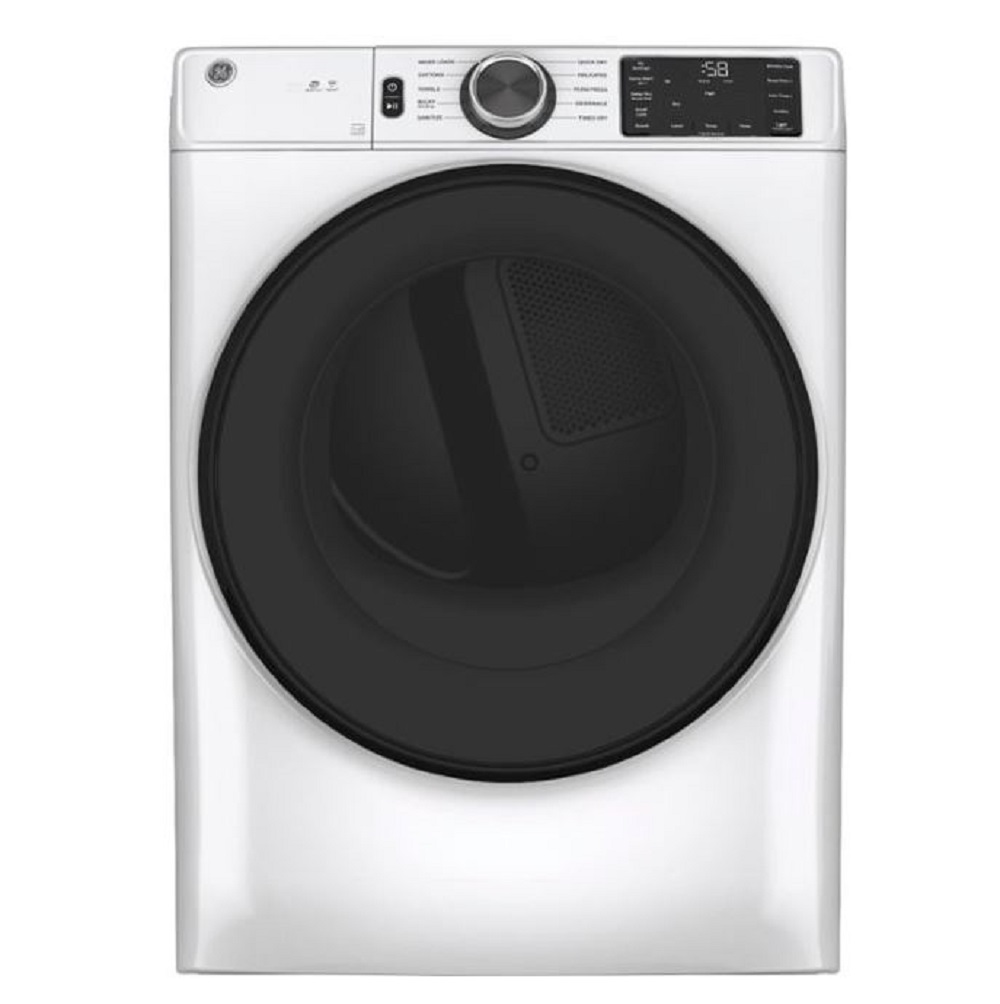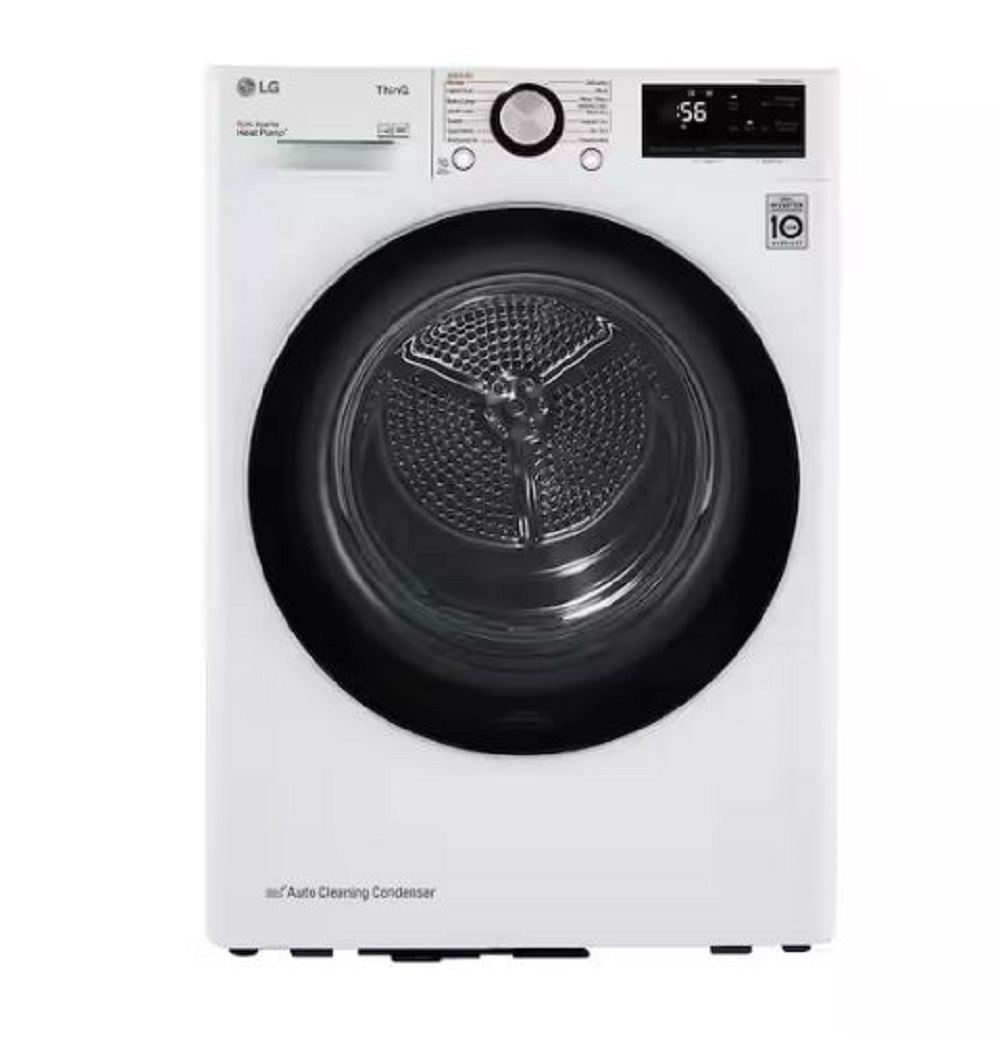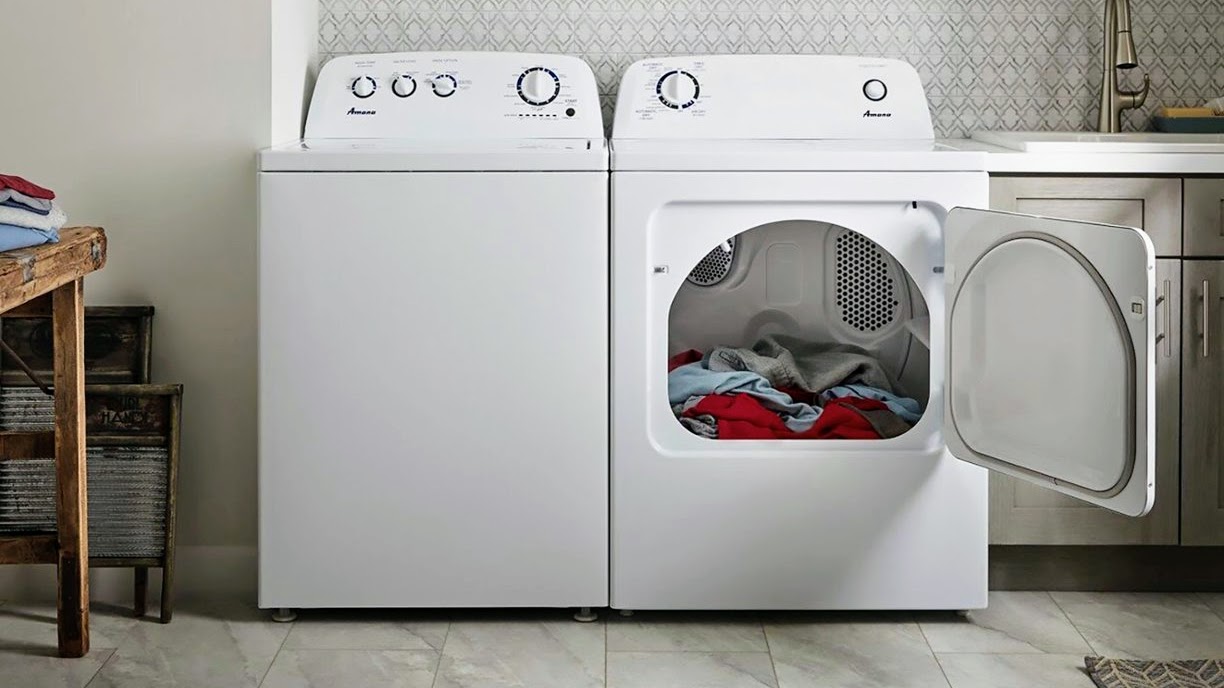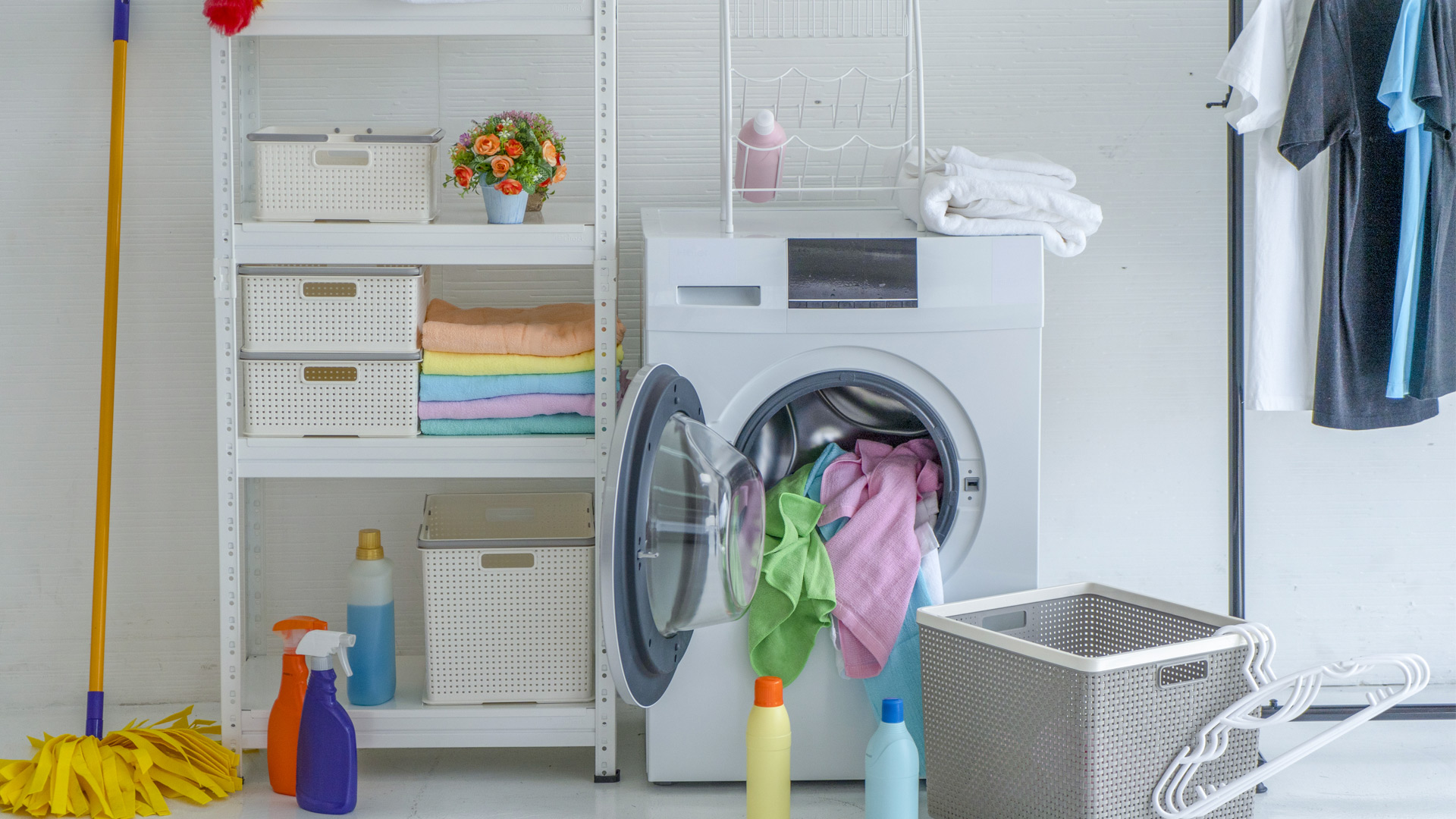
Type: Front load, electric, vented
Capacity: 7.8 Cu. Ft.
Cycles: 10
Features: Moisture sensor, stackable
Warranty: Limited 1-year entire appliance
The GE 7.8 cu. ft. electric dryer is praised for its efficiency and spacious capacity, easily handling bulky items like bedding. Users appreciate its 10 drying cycles, which offer tailored options for different fabrics, and the sensor drying technology prevents over-drying. Its quiet operation and intuitive digital controls enhance the overall user experience.
Pros
- Efficient and spacious
- Customized drying options
- Stackable
- Quiet operation
Cons
- Limited smart functionality
- Longer drying times for certain loads

Type: Front load, electric, ventless
Capacity: 4.2 cu. ft.
Cycles: 14
Features: Sensor dry, lint filter
Warranty: 1 year parts and labor, 3 year drum
The LG 24 in. W 4.2 Cu. Ft. Ventless Stackable Compact SMART Electric Dryer has a good drying capacity and plenty of drying cycles to choose from. It can also connect to the LG ThinQ app which means that you can start the laundry while you're out and receive update notifications. Connect to Alexa for voice control.
Pros
- Decent capacity
- ENERGY STAR certified
- WiFi connectivity
Cons
- Stacking kit not included
- 3-hour drying time may be too long for some households
Choosing the right appliance can make all the difference when it comes to drying your laundry. Understanding the differences between condenser dryers and vented dryers can help you make an informed decision based on your household size, budget, and drying needs. So when you're looking to purchase one of the best dryers, what's the difference between a condenser dryer vs vented?
As with all appliances, each has advantages and disadvantages. I'll explain the key differences in price, design, features, power and size so you can make the right choice for your needs, and I'll ask the experts for their opinions.
Condenser dryers vs vented: What's the difference?
"The biggest difference between the two is the way they remove water from clothing and the machine," explains laundry expert Ken Doty.
"The more common type of dryer that is found in most homes is a vented tumble dryer. These types of dryers feature a long and flexible hose that connects to the dryer and the water outside your home. This is why you usually see dryers installed close to an external wall or window."
So, how does this compare to a condenser dryer? "A condenser dryer collects the moisture from your clothes in a container within the dryer," says Doty. The tank will gather water until it's full, and you manually empty the excess. The main benefit of this is being able to place the unit anywhere in your household."

Ken Doty joined The Maids International in July 2013 as Vice President of Business Intelligence and was promoted to Chief Information Officer in February 2020. He is experienced in business intelligence with over 20 years of experience in consulting and information technology. He loves talking shop with other cleaning service professionals, and offering cleaning tips to anyone who asks!
Arne Helgesen, CTO at Sharecat and a seasoned tech expert says "Condenser dryers tend to be less expensive upfront and dry clothes more quickly. They’re also more compact and versatile in terms of installation. However, they consume more energy and can be harsher on fabrics due to higher heat. Additionally, they may increase the humidity in the room."

Arne Helgesen, CTO at Sharecat, is a seasoned tech expert and IT leader with an impressive track record in consumer electronics and technology management.
Condenser dryers vs vented dryers: Price
From my research, there isn't a great deal of price difference, but I did find that vented dryers have more options in the mid-range and higher end of the market than condenser dryers. Cubic feet capacity tends to be more limited with condenser dryers, too, with fewer options available over 6 cu. ft.
For a basic vented dryer, like the Whirlpool 7.0 cu. ft. 240-Volt White Electric vented Dryer with AUTODRY Drying System on Home Depot, prices range from $500 to $650. A mid-range model, like the Maytag 7.0 cu. ft. Vented Pet Pro Electric Dryer are around the $800 mark, and high-end luxury models, such as the LG SIGNATURE 9.0 Cu. Ft. Vented SMART Gas Dryer in Black Stainless Steel with Touch Control Panel and TurboSteam can reach $2,000.
And don't forget, if you haven't already got a vent installed in your home, you'll have to front up more money to have that added if you want a vented dryer.
For a basic condenser dryer, such as the Energy STAR-rated GE 4.1 cu. ft. 240-Volt White Electric Ventless Dryer, you can expect to pay around $900, but you are sacrificing some capacity here. A mid-range model with a higher capacity is the Samsung 7.5 cu. ft. Stackable Heat Pump ventless Electric Dryer with Sensor Dry in White, at around $1,500, while the Whirlpool 7.4 cu. ft. 240-Volt Stackable Chrome Shadow Electric Ventless Dryer with Intuitive Touch Controls will set you back by over $1,800.
Verdict: There isn't a great deal of price difference but you may have to pay more for increased capacity with a condenser dryer, while you may have to fork out a little more for installation of a vented dryer in your home.
Condenser dryers vs vented dryers: Design & Features
Vented dryers expel hot, moist air outside through a vent, so they need an external duct for installation. They tend to have faster drying times and come in larger capacities. However, they are less energy-efficient and have fewer advanced features compared to ventless models. But they're ideal for homes with accessible venting and if you want the speed and simplicity that a vented dryer offers.
"The main benefit of condensed dryers is the flexibility in terms of placing it in your home," says Doty. "This is a great feature if you don't have the space for ventilation to the outside for water moisture." Condenser dryers tend to be more energy-efficient too. Though they may take longer to dry clothes, their compact, flexible design makes them suitable for spaces where venting isn’t possible, and they often come with more advanced features like moisture sensors.
Verdict: Condenser dryers have the edge over vented dryers since they can be placed anywhere in the home, are more energy efficient, and tend to have more advanced features.

Condenser dryers vs vented dryers: Power & Size
Vented dryers typically use more power, as they rely on high heat and continuous airflow to dry clothes quickly. They come in a variety of sizes, with larger models offering more capacity, making them ideal for bigger loads. Due to their design, they tend to have standard, bulkier dimensions and are generally less energy-efficient, consuming more electricity per cycle.
Comparing condenser dryers vs heat pump dryers, the heat pump models are more energy-efficient since they use lower temperatures and recycle hot air to dry clothes, consuming less electricity overall. They tend to be more compact than vented and available in smaller sizes, making them a good fit for tighter spaces. However, the drying process can take longer, and capacity can be smaller than vented dryers, although larger models exist.
"Which one you go for depends on the size of your living space, family size and collective laundry needs," says Doty. "If you live in a bigger space with a large family that does laundry every other day, a vented dryer may be your best option. But if you're living in an apartment with a smaller surface area and don't mind more maintenance to save money, a condensed dryer could suit you just fine."
Verdict: Your choice depends on space, family size, and laundry habits: vented dryers suit larger households with frequent loads, while condenser dryers are better for smaller spaces and those looking to save on energy.
Condenser dryers vs vented dryers: Our verdict
When choosing a dryer it'll depend on the size of your household, your home's layout, your budget and individual laundry needs.
Comparing condenser dryers vs vented dryers, the price gap isn't significant, though vented dryers tend to offer more options in the mid-range and high-end of the market.
Vented dryers are ideal if you need larger capacities, with many models exceeding 6 cu. ft. For instance, basic models like the Whirlpool 7.0 cu. ft. vented dryer start around $500, with mid-range options like the Maytag Pet Pro Electric Dryer priced at around $800. High-end luxury models can reach up to $2,000, such as the LG SIGNATURE 9.0 cu. ft. SMART dryer. However, if your home lacks an external vent, you’ll need to factor in additional installation costs.
Condenser dryers, like the Energy STAR-rated GE 4.1 cu. ft. ventless dryer, start at a higher price point, around $900, and typically come with smaller capacities. These models offer more flexibility since they don’t require venting and tend to be more energy-efficient, though they may take longer to dry clothes.
Verdict: A condenser dryer is best if space is tight or you want energy savings. For larger households with frequent laundry needs, a vented dryer’s speed and capacity make it a better choice.

Condenser dryers vs heat pump: FAQs
Which is better for the environment: vented or condenser dryer?
Condenser dryers, especially heat-pump models, are generally more environmentally friendly than vented dryers due to their energy efficiency.
They recycle hot air and use lower temperatures, which means that they consume less energy and reduce carbon emissions.
Vented dryers, on the other hand, use more energy as they constantly heat air and expel moisture outside, resulting in higher energy consumption.
Which is cheaper to run: vented or condenser dryer?
UK consumer group Which? has looked into how much it costs to run a dryer by comparing the running costs of condenser dryers and vented dryers. It found that vented dryers are typically more expensive to operate, with the average vented dryer costing around £28 ($37) more in running costs across the year than the average condenser dryer.
This difference in energy consumption is pretty big, especially considering that heat pump dryers, a type of condenser dryer, offer even more savings. While vented dryers may be more affordable upfront, the long-term running costs can quickly add up, making them more expensive overall.
Therefore, if you’re looking to reduce your ongoing energy expenses, opting for a condenser dryer is likely to be the better choice.
Which will dry clothes quicker: vented or condenser dryer?
Vented dryers typically dry clothes faster than condenser dryers. This is because they work by expelling hot, moist air outside while drawing in fresh air, allowing them to maintain higher temperatures and airflow during the length of the drying cycle. A standard vented dryer will dry laundry in about 30 to 60 minutes, depending on the load size and dryer model.
Condenser dryers operate by collecting moisture from the clothes and condensing it into water, which is then either stored in a tank or drained away. While they are generally more energy-efficient the drying process can take longer, often ranging from 60 to 120 minutes.
